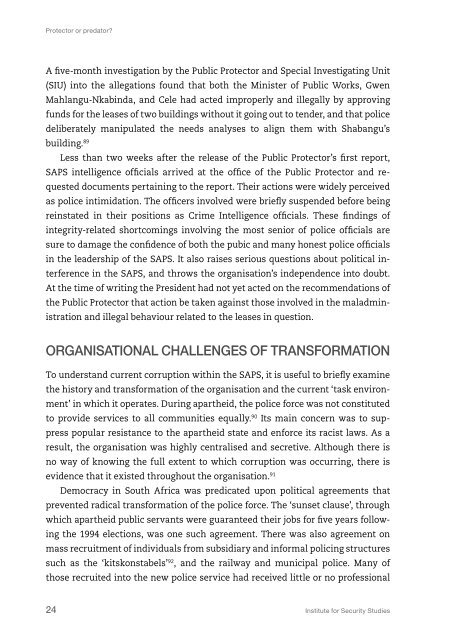Protector or predator? - Institute for Security Studies
Protector or predator? - Institute for Security Studies
Protector or predator? - Institute for Security Studies
You also want an ePaper? Increase the reach of your titles
YUMPU automatically turns print PDFs into web optimized ePapers that Google loves.
<strong>Protect<strong>or</strong></strong> <strong>or</strong> predat<strong>or</strong>?<br />
A five-month investigation by the Public <strong>Protect<strong>or</strong></strong> and Special Investigating Unit<br />
(SIU) into the allegations found that both the Minister of Public W<strong>or</strong>ks, Gwen<br />
Mahlangu-Nkabinda, and Cele had acted improperly and illegally by approving<br />
funds f<strong>or</strong> the leases of two buildings without it going out to tender, and that police<br />
deliberately manipulated the needs analyses to align them with Shabangu’s<br />
building. 89<br />
Less than two weeks after the release of the Public <strong>Protect<strong>or</strong></strong>’s first rep<strong>or</strong>t,<br />
SAPS intelligence officials arrived at the office of the Public <strong>Protect<strong>or</strong></strong> and requested<br />
documents pertaining to the rep<strong>or</strong>t. Their actions were widely perceived<br />
as police intimidation. The officers involved were briefly suspended bef<strong>or</strong>e being<br />
reinstated in their positions as Crime Intelligence officials. These findings of<br />
integrity-related sh<strong>or</strong>tcomings involving the most seni<strong>or</strong> of police officials are<br />
sure to damage the confidence of both the pubic and many honest police officials<br />
in the leadership of the SAPS. It also raises serious questions about political interference<br />
in the SAPS, and throws the <strong>or</strong>ganisation’s independence into doubt.<br />
At the time of writing the President had not yet acted on the recommendations of<br />
the Public <strong>Protect<strong>or</strong></strong> that action be taken against those involved in the maladministration<br />
and illegal behaviour related to the leases in question.<br />
OrGANiSATiONAl CHAllENGES OF trANSFOrmATiON<br />
To understand current c<strong>or</strong>ruption within the SAPS, it is useful to briefly examine<br />
the hist<strong>or</strong>y and transf<strong>or</strong>mation of the <strong>or</strong>ganisation and the current ‘task environment’<br />
in which it operates. During apartheid, the police f<strong>or</strong>ce was not constituted<br />
to provide services to all communities equally. 90 Its main concern was to suppress<br />
popular resistance to the apartheid state and enf<strong>or</strong>ce its racist laws. As a<br />
result, the <strong>or</strong>ganisation was highly centralised and secretive. Although there is<br />
no way of knowing the full extent to which c<strong>or</strong>ruption was occurring, there is<br />
evidence that it existed throughout the <strong>or</strong>ganisation. 91<br />
Democracy in South Africa was predicated upon political agreements that<br />
prevented radical transf<strong>or</strong>mation of the police f<strong>or</strong>ce. The ‘sunset clause’, through<br />
which apartheid public servants were guaranteed their jobs f<strong>or</strong> five years following<br />
the 1994 elections, was one such agreement. There was also agreement on<br />
mass recruitment of individuals from subsidiary and inf<strong>or</strong>mal policing structures<br />
such as the ‘kitskonstabels’ 92 , and the railway and municipal police. Many of<br />
those recruited into the new police service had received little <strong>or</strong> no professional<br />
24<br />
<strong>Institute</strong> f<strong>or</strong> <strong>Security</strong> <strong>Studies</strong>

















